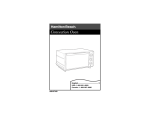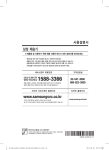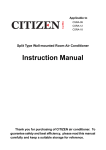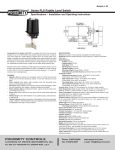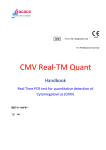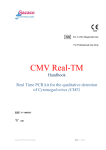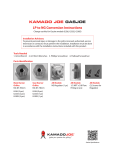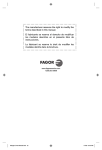Download Owner`s Manual - fredsmusicandbbq.com
Transcript
Owner’s Manual Bonus: Primo Starter Recipes Included * * * Copyrighted Material * * * Primo® Grills and Smokers Owner’s Manual Copyright © 2007 by Primo® Grills and Smokers Published by: Primo® Grills and Smokers 5999 Goshen Springs Road Norcross, GA 30071 USA OFC: 770.729.1110 FAX: 770.729.1111 www.primogrill.com All rights reserved. No part of this publication may be reproduced or transmitted in any form or by any means, electronic or mechanical, including photocopying, recording or any information storage or retrieval system, without written permission from the publisher. For information please contact us at [email protected]. MANUFACTURED IN THE USA 2 CONGRATULATIONS We appreciate your choice of a Primo Grill and Smoker. Properly setup and use, your Primo should provide years of worry-free outdoor cooking pleasure. It’s important that you follow each step in this guide carefully to insure proper use and maintenance. SPECIFICATIONS OVAL XL OVAL JR KAMADO Weight 192 lbs 95 lbs 140 lbs Cooking Surface 400 sq/in 210 sq/in 280 sq/in Rack Extensions up to 680 sq/in up to 360 sq/in N/A 3 Primo® Grills and Smokers Lifetime Warranty Creative Ceramic Technologies, Inc. (CCT) warrants to the original purchaser of this Primo grill and smoker that it is free of defects in material and workmanship at the date of purchase for the following periods: • • • • Twenty (20) years for all ceramic parts Five (5) years for all metal parts (excluding cast-iron parts) One (1) year for all cast-iron parts Thirty (30) days on thermometers and felt gaskets This warranty shall be limited to the repair or replacement of any part(s) which, under normal use, Primo determines, after reasonable examination, to be defective. In order to invoke this Warranty, Purchaser shall ship all defective parts at his/her expense to: ATTN: WARRANTY REGISTRATION Primo Grills and Smokers 5999 Goshen Springs Road, Norcross, GA 30071 Phone: 770.729.1110 Fax: 770.729.1111 Primo shall replace parts found defective as provided above with equivalent parts and shall ship such parts at the Purchaser’s expense to the Purchaser’s designated shipping address. THIS LIMITED WARRANTY SHALL NOT COVER THE FOLLOWING: Any damage, failure, or operating difficulties caused by accident, abuse, misuse, alteration, misapplication, vandalism, improper installation or improper maintenance; cracks or chips in the exterior glazing after delivery to an authorized Primo dealer or distributor; damage or failure caused by tampering with or altering the original Primo design, except when directed or authorized by CCT; damage or failure caused by Purchaser’s failure to follow federal, national, state, city or county building and fire codes. TO THE MAXIMUM EXTENT PROVIDED BY STATE AND FEDERAL LAW, THIS LIMITED LIFETIME WARRANTY IS IN LIEU OF ALL OTHER WARRANTIES, EXPRESS OR IMPLIED, AND SPECIFICALLY EXCLUDES THE FOLLOWING: • • • WARRANTY TO ANYONE OTHER THAN THE ORIGINAL PURCHASER; WARRANTIES OF MERCHANTABILITY AND FITNESS FOR A PARTICULAR PURPOSE; ANY AND ALL LIABILITY FOR INCIDENTAL, SPECIAL OR CONSEQUENCIAL DAMAGES, EXCEPT WHERE SUCH EXCLUSION IS EXPRESSLY PROHIBITED BY LAWS OF THE STATE OR THE ORIGINAL PURCHASER’S RESIDENCE. 4 Contents INTRODUCTION Greetings ....................................................................................... 06 Kamado History ............................................................................. 07 The Primo Advantage .................................................................... 07 Safety Precautions ......................................................................... 08 Standard Features ......................................................................... 09 Accessories .................................................................................... 10 GETTING STARTED Primo Assembly ............................................................................. 11 Cradle Assembly ............................................................................ 12 Cradle Side-Table Assembly ......................................................... 14 Table Assembly ............................................................................ 15 FIRST USE Natural Lump Charcoal .................................................................. 17 Prepare to Cook ............................................................................. 18 Lighting the Coal ............................................................................ 19 Temperature Control: Vent Adjustment Guide............................... 20 Preparation Temperature/Time Guide ........................................... 21 Meat Temperature Guide ............................................................... 22 First Cooking Experience ............................................................... 23 1st Primo Turkey, Chicken, Burger, Fish ................................ 23 1st Primo Steak, Rib Roast, Ribs, Vegetable.......................... 24 FREQUENTLY ASKED QUESTIONS........................................... 25 5 Introduction from Maria Nation, Massachusetts New Primo Owner! Greetings! If you’re at all like me or the many Primo-istas I’ve met in the last year, your new grill is going to change your life; or at least the hours of your life that you spend at the grill! Let me tell you right off the bat that I’m an odd choice to be writing this introduction. I’m not associated with the company, I don’t know the difference between North Carolina and Kansas City barbecue, and until very recently I thought of grilling as strictly a “guy thing,” like understanding fantasy football or not asking for directions. Primo® changed all that. It isn’t just the look and feel of the thing, although the simple lines and the heavy ceramic heft have grown on me, like a piece of art that is both prosaic and exotic. I love introducing my friends to the Primo® by having them just lift the dome – all that weight in your hand, yet balanced and manageable because of the clever engineering of the hinge – then let it close, and the dome stops with a satisfying thump, decisive and secure, on the felt gasket. Right away the serious heft of the Primo® lets you know you’ve left the land of “Webers” far behind. But I’m not a Primo fan because it looks good. I’m a fan because Primo makes me look good. Even for a grill novice like me, the Primo method of grilling/smoking makes it easy to cook everything from perfectly flashseared tuna to 20-hour low & slow genuine barbecue, succulent, smoky and falling-off-the-bone tender. I’ve always been a serious chef inside my kitchen; Primo lets me take my culinary adventures outdoors and it has become my partner-in-creation, inspiring me to try everything from grilled pizza to cold-smoked cheese; from sour dough bread to (I kid you not) fried eggs for breakfast. Why stop with burgers when the Primo beckons me to ever new possibilities? It is a cooking phenom! And then there’s the big secret that Primo has let me in on after all those years: Grilling and smoking isn’t hard (so much for the “mystery on the deck!”); in fact, it’s really fun. Perhaps this is why I’ve become such a Primo fan. It’s just fun to use. In this over-hyped world, where gizmos and gadgets are hawked 24/7, it’s rare to come across a product, and a company, that is actually better than it claims to be. The guys at Primo have made an amazing product. They stand behind it with integrity, and with pride. Get to know your Primo, and you’ll understand why. Happy grilling! Maria Nation — Massachusetts (aka Grill Girll on the Primo Forum) 6 Introduction Kamado History The modern kamado-style grill is based on ancient Japanese technology used over 2000 years ago. Originally composed of clay, the kamado was typically built into the earth floor of pit homes - small houses built into the ground. By the early 1600’s advancements in the kamado design and function included highend, portable kamados which attracted the attention of those in the elite and urban communities, and soon became common-place in their households. By literal translation, the word “kamado” in Japanese means ‘oven’, ‘stove’, or more recently, ‘kitchen’. But it represents more than just perfection in functional design and exquisite, flavorful food. Historically, the kamado was and still is a symbol of “family”, of “home”. The Primo® Advantage - “Ovalrules” Primo combines the concept of traditional kamado-style (round) cookers, and charcoal grills with an innovative design, premium quality ceramic materials, and a sophisticated, modern look, creating a best in class, all-in -one cooking machine. What makes a Primo better than other ceramic grills and smokers on the market today? The key is in the composition and patented oval shape. Ceramic Composition. Primo uses only the highest quality ceramic for increased efficiency and durability. Meals prepare faster while moisture and flavor remain locked inside, leaving food juicy and tender, not dry. And the outer surface stays at a safe, warm-to-the-touch temperature. Oval Shape. But it’s the versatility of our patented Primo Oval™ shape that really sets us apart. Enjoy more features and options such as reversible cooking grids, rack extensions* to increase total cooking surface, or a drip pan rack* to catch meat juices. Add a firebox divider* and cook directly over the heat on one side and smoke on the other. We hope you enjoy your new Primo. Bon appetite! *optional accessory 7 Introduction Safety Precautions • • The Primo® is designed for OUTDOOR use only. Primo should NEVER be placed on a wooden deck , even with the ceramic feet provided. Use the cradle or table when cooking on a wooden deck. • Allow for proper clearance. Never set the Primo® directly on or near anything flammable (grill clear of hanging trees and shrubbery). • Avoid flashback or fire balls. When operating the Primo® at temperatures above 500° F with both the top and bottom vents closed, take caution when reopening the lid. In rare instances, quickly opening the lid when the burning coal is severely deprived of oxygen can cause a blast of flames or fire ball. Open both vents. Wait 10 -15 seconds, then open the lid 1 inch and pause before fully raising the lid. This will allow the sudden rush of oxygen to burn safely, and not as flashback which could startle you and possibly cause injury. • • Avoid back draft. Do not close the top vent when you have an established hot fire and relatively new lump charcoal in the cooker. Close the bottom vent first if you need to shut things down. NEVER USE LIGHTER FLUID! • Operate your PRIMO® in a safe area well away from overhanging trees or flammable materials and substances. • Children should never use the Primo®. • Keep children away from the unit while in use and during cooldown time. Failure to follow the safety precautions outlined above may cause severe damage and/or injury. Damages resulting from improper use of the Primo® are not covered by the warranty. Do not modify the Primo® design without written approval by the Creative Ceramic Technologies Company. 8 Introduction Standard Features and Components • Premium Grade Ceramics • Stainless Steel Bottom Vent • Cast-Iron Chimney Top Vent • True Precision Thermometer • Cool-Touch Handle • Heat-Safe Feet • Easy Lift-and-Lock Hinge System • Soft-Close Lid Insulation Strips • Quick-Clean Porcelain Cooking Grids • Resilient Black Porcelain Glaze Finish • Lifetime Warranty 9 Introduction Accessories • Oak Table • Cypress Table • Composite Table • Cradle • Ash Tool • Cooking Rack Extension • Drip Pan Rack • Firebox Divider • Grill Lifter • Chicken Sitters • Turkey Sitters • V-Rack/Rib Rack • Pizza Baking Stone • Natural Lump Charcoal • Digital Meat Thermometer • Grill Covers • Quick Light Fire Starters 10 Getting Started Primo Assembly Resting the Primo in it’s final destination: This product is heavy and not easy to more. You must be careful when you move it to it’s final resting destination. 2-3 people are recommended to move the outer shells. First remove all inside components and move the outer shell (lid and bottom) to the desired location. Do not attempt to loosen the bands or the hinge assembly. Placing this unit in a Primo Cradle or our Cypress Wood Table will demand good handling and many hands to do the work properly. Any mishandling will not be covered under the warranty. Firebox Placement Your Oval firebox is manufactured as a one piece unit. Notice the air vent in the front. “Carefully” place the firebox inside the Oval bottom with the vent holes aligning with the air control vent of the Oval bottom. This is important for proper air flow to your unit. Placing the inside components Find the ceramic Bottom plate and place into the bottom of the firebox. The ceramic bottom plate puzzles into the base of the firebox with the flat surface facing upward. Next, place the bottom grate at the mid-base of the firebox with the divider slots facing upward. These slots are going to secure the Oval firebox divider which is sold separately as an accessory. Securing the screws of the band assembly Our factory sends pre-assembled unit, but for your benefit, please ensure that the screws are tight at all times. Bent screws is a good sign, but may loosen after some period of time. From the heat, your bands may expand over time and reduce it’s ability to fit tightly on your Primo...Check periodically and tighten as needed. 11 Getting Started Cradle Assembly A - Oval Ring (2) B-Long Crossbars (2) C-Short Crossbars (2) D-Raising Bars (4) E-Caster Wheels (4) F-Hardware Pack G-Clinch Screws (2 long, 3 short) H-Large Kept Nuts (4) I-Round Head Screws (9) J-Round Nut Cap (4) K-Small Kept Nuts (14) Lay the two longer crossbars (B) down and fit with Round Head screw in the center. Place center-curved crossbar under the straight crossbar. Round Head Screw (T) and a nut (K). Place casters under crossbar. Preferably, place locking wheels on the front as shown here. Locking wheel is unlocked when flap is up (shown left). Use the (K) nut to secure the wheels in place and the (X) washer. Secure raising bars (D) on base with a large round nut (H). Note that the raising bars are curved inward. The raised bars are placed inwards. 12 First Use Cradle Assembly (continued) For the upper support crossbar (C), secure with a short Clinch Stud. (G & K). Then affix the upper crossbar to the raised bar by using the top hole. Secure the cross-bars. Use the longer clinch stud when connecting the rings section to the upper crossbar. Connect in the upper hole. Use the short clinch stud when connecting the ring to the upper crossbar. Use (J) caps fo final finish on top bands. 13 Getting Started Cradle Side Table Assembly Place the first bracket on the cradle by unscrewing the four nuts located at the metal ring with the 4 legs of the cradle. Note that the top of the brackets will have to point outward to the sides. Put each metal support bracket on the outside of the leg placing the upper hole of the bracket through the screw while replacing the nut in position. Don’t tighten yet and don’t place the bottom screw; adjustment may be required. Hardware A) 4 Short Screws B) 4 Black Washers C) 4 Large Nuts D) 8 Long Screws E) 8 Small Nuts Other (8) Copper Ring Spacers (4) Black Brackets Place one (D) long screw from the outside of the bracket through the sliding hole of the shelve hinge. The screw must be placed in from the outer part of the bracket. Make sure that you insert the long screw into the copper ring spacer before inserting into shelve hinge. Repeat the same on the other bracket hole. Secure the screws with a nut and black washer (in between shelve and bracket) on the top screw and a nut on the bottom screw. The last step is to secure the brackets with the large short screw and the nut accompanying it. 14 Getting Started Cypress Table Assembly The cypress or oak table comes shrink-wrapped for shipping purposes. Carefully cut the wrapping and lay out the table pieces. Look for the hardware package stapled under one of the table panels. Unscrew the protective wooden panels temporarily attached to the table. These were added for protection during shipping. Dispose of them. Place the top of the table down on a smooth surface and erect the side legs of the table. Position the locking wheels with the front of the table as shown. Secure both side leg sections. Place a bolt through the table and the side leg stud and secure from the inside using a washer and nut. Tighten the nut lightly. Later, when all bolts are in, completely secure the nuts. Do the same with the middle section of the table, securing all four corners. On the second round of tightening, secure the bolt until the wood becomes slightly compressed. 15 Getting Started Table Assembly (continued) Place your grill inside the wooden table using the ceramic shoes. Simply place the shoes at the approximate position where your grill will rest. Carefully lift the grill by placing a hand inside the vent and the other under the grill and make your way to the opening of the table. Two people are required for this lifting. WARNING: You should NEVER lift Primo Grill and Smoker from the hinge mechanism attached to the black bands. Lifting the cooker from the bands and hinge mechanism can result in personal injury and will void the warranty if damage occurs. If dropped, the ceramic will break. Once in place, the grill should be ready to go. You may adjust the position of the ceramic feet as needed. You may also use a stain or a polyurethane to seal on the cypress or oak wood. 16 First Use Natural Lump Charcoal For cooking purposes, charcoal comes in two different shapes: lump charcoal and briquettes. Lump charcoal is charcoal which has not been formed into briquettes. Briquettes are the pillow shaped little pieces of compressed ground charcoal. Always use lump charcoal in the Primo®. Primo® Grills and Smokers use a fire bowl to hold the charcoal. As the charcoal burns, the ash falls down into the bottom of the bowl. There isn't much room for a lot of ash. Lump charcoal produces low amounts of ash and will burn at whatever rate and temperature that you allow it to. It also tends to burn hotter and light faster than briquettes. The Process Natural Lump Charcoal comes from partially burning wood or heating wood without the use of oxygen. In doing so, this charred wood becomes carbon. During the process of making charcoal, volatile compounds in the wood (water, hydrogen, methane and tars) pass off as vapors into the air, and the carbon is converted into charcoal. The Properties Since Charcoal is pure wood carbon, it weights much less than its original state. It is also free of tars (which can contain carcinogenic compounds, like benzo-a-pyrene). Unlike charcoal briquettes, which contain different chemicals, natural charcoal is 100% carbon. Types of Lump Charcoal There are 2 types of charcoal: the first type comes from natural wood which has been cut and made into charcoal. This is as natural as you can get. The wood comes from trees, branches and scrap pieces from saw mills. The second type comes from using processed scrap wood and tuning it into charcoal. Processed scrap wood tends to burn faster since its density is less than natural. This is because there is less moisture in the wood at the time it is transformed into charcoal. Lighting Lump Charcoal Never use starter fluid! It will give a undesirable flavor to your food and impregnate into the ceramic of your Primo® Grill and Smoker. There are many other ways to light lump charcoal. You can use paraffin fireplace starter blocks (Primo® recommended), electric starters, propane sticks, weed burners, propane torches, MAP gas torches and Chimney starters. 17 First Use Prepare to Cook DETERMINE FIREBOX FILLING Half Firebox: Fill the firebox half way when preparing smaller amounts of food or when cooking at milder temperatures. Use the Primo® firebox divider (sold separately) to cook on one small section of your grill. Full Firebox: Fill firebox to within four inches of the top. Use this for larger amounts of food, hotter cooking temperatures, or longer cooking times; i.e. slow-cooked ribs would require a full firebox. FILL FIREBOX WITH LUMP CHARCOAL Only use pure lump charcoal. No briquettes! Sprinkle in smoking woods (fruit wood, hickory, etc) for flavor if desired. Fill the firebox either half way or fully with lump charcoal. REMOVE ASH AND DEBRIS (after the first use if needed) Use the ash rake to “stir” the coal from your prior cooks to remove ash from the leftover coal in the firebox (it naturally falls to the bottom of the grill). Then use the ash rake to scoop ash out of the lower vent. Cold ash and debris make great compost for gardens. FULLY OPEN TOP AND BOTTOM VENTS Doing so allows air flow to the coal when first starting the grill. LIGHT THE CHARCOAL For ½ a firebox, bury one or two starter pouches (Primo® Quick Lights are recommended) halfway down in the charcoal. For a full firebox, use two or three pouches. You may also use a starter chimney or, if monitored closely, an electric fire starter. CLOSE THE LID Be sure the fire has started and the top and bottom vents are fully open. INSERT RACKS Wait a few minutes, open the lid and reinsert the cooking racks. Then close the rack again. MONITOR THERMOMETER Watch the thermometer. Once the grill approaches the desired temperature, partially close the vents to maintain that temperature. Note: See the Vent Adjustment Guide in this manual for example vent settings for various temperatures and food. Note: It’s easier to heat up the grill than it is to cool it down. If you exceed the desired temperature, open the lid to let the outside air cool off the grill and lower the temperature. Warning: Take caution when opening the lid. In rare instances, the burning coal may be severely deprived of oxygen and could cause a fireball. To avoid this, always crack the lid and pause before opening fully, allowing oxygen to reach the coal 18 First Use Lighting the Coal - Illustration With Firebox Divider Without Firebox Divider 19 First Use Vent Adjustment Guide Review the illustration below for approximate chimney and bottom vent settings for various food. 20 First Use Primo Preparation Time Guide The following meat temperatures are given as approximations. Experience is your best guide. For your safety, we recommend using a meat thermometer to ensure the quality and the proper safe temperature of your food. Low & Slow Cooking 225°F - 275°F Prime Rib Roast Chicken Wings Ribs (pork) Boston Butt (pulled pork) Roast (8-15 lbs.) 2.5-3 hours 60-70 minutes 3-4 hours 9+ hours 2-4 hours Cooking at 325°F - 350°F Chicken (whole) Chicken (cut) Ham Turkey (whole, stuffed, 18 lbs.) Turkey (whole, stuffed, 12 lbs.) Shrimp Pork Tenderloins Leg of Lamb Fish Searing Temperatures 500°F - 700°F Steak Hamburgers Pork Chops (2” thick) London Broil (2lb) 60-80 minutes 30-45 minutes 2-5 hours 3-4 hours 2-3 hours 5-8 minutes 20-30 minutes 3-4 hours 15-20 minutes 6 minutes 6-10 minutes 6 minutes 6-15 minutes Helpful Hint: The Boston Butt Roast is the cut of choice for pulled pork barbecue since it’s marbled with enough fat to keep the meat moist while cooking. Substitutes: Pork picnic roast or pork center cut loin roast (lower in fat; roast at a lower temperature and avoid overcooking) 2 hours per pound at 225 degrees is a good rule of thumb. Remember this is for the individual piece of meat not the total weight. Two 5 pound butts (10 pounds total) should cook in about 10 hours as long as there is some separation on the grill. 21 First Use Meat (Internal) Temperature Guide Ground Products Hamburger Beef, veal, lamb, pork Chicken, turkey 160°F 160°F 165°F Beef, Veal, Lamb Roasts & Steaks Medium-rare Medium Well-done 145°F 160°F 170°F Pork Chops, Roast, Ribs Medium Well-done Sausage fresh 160°F 170°F 160°F Poultry Chicken, whole & pieces Duck Turkey (un-stuffed) Whole Breast Dark meat Stuffing (cooked separately) 180°F 180°F 180°F 180°F 170°F 180°F 165°F Eggs Fried, poached Yolk & whites are firm Casseroles 160°F Sauces Custards 160°F 22 First Use First Cooking Experience 1st Primo Turkey Grill Temperature: 275° - 300°F • Place turkey, 10-15 lbs, on a Primo® Sitter (sold separately) and coat with your favorite spices. You may place your beverage of choice, herbs, or any flavored juices/sauces inside your sitter before setting your turkey upright. • Retain temperatures of 275 - 300°F until done. Use a meat thermometer for safe temperature of poultry. • Raise the temperature to 500ºF in the last 20 minutes for a stronger roasting effect. 1st Primo Chicken Grill Temperature: 325° - 350°F • Place chicken on a Primo® Sitter (sold separately) and coat with your favorite spices. You may place your beverage of choice, herbs, or any flavored juices/sauces inside your sitter before setting your chicken upright. • Retain temperature of 325 - 350°F until done. Use a meat thermometer to gauge poultry temperature. • Baste your chicken with extra sauce, though it isn’t necessary when using your Primo® Grill. The moisture retaining capability of your Primo® will not dry your food. 1st Primo Burger Grill Temperature: 450° - 500°F • Cook burgers with onions, lid down, for 6 minutes on each side. • Reduce temperature by closing top and bottom vents. • Add cheese (optional) in the last minute of preparation time. Warm buns. 1st Primo Fish Salmon is the preferred 1st time choice Grill Temperature: 325° - 350°F • Place your salmon steak or filet on the Primo® when temperature level is achieved. • Sprinkle herbs, sea salt and fresh ground pepper. • Retain temperatures of 325 - 350°F until done. 10-15 minute per lb of fish. Use a meat thermometer for safe temperature for fish. 23 First Use First Cooking Experience (continued) 1st PRIMO Steak Grill Temperature: 650-750°F • About 30-40 minutes before cooking time, rub your favorite marinade into the steaks, and let them come to room temperature. • Grill the steaks at 550-600 degree for 3 minutes, flip, cook for an additional 3 minutes. • Close both top and bottom vents and allow to dwell to desired doneness (1-3 minutes for medium rare) . • Transfer the steaks to a platter. Spread mushrooms over the tops of the steaks. Optional: Cover each steak equally with your choice of sauce. • Serve the steak immediately. 1st PRIMO Rib Roast Grill Temperature: 450°F • Place your rib roast on a Primo V-Rack and cook for approximately 35 minutes for a 6 lbs roast. If using the Primo® OvalTM, use the Primo® firebox divider and cook indirectly. • Reduce grill temperature to 300º F • Turn roast over and cook to desired meat temperature level. Use meat temperature probe for accurate temperature level. 1st PRIMO Ribs Grill Temperature: 325° - 350°F • Place your ribs on the Primo V-Rack (sold separately) or directly on the Primo® when temperature level is achieved. You may sprinkle herbs, spices. Wait until the last 20 minutes to pour your sauces. • Retain grill temperatures of 275-300°F until done. Using a meat thermometer can be misleading with ribs. Check the temperature frequently • 1 hr/pound is a conservative time period. If you are using our Primo® Oval, utilize the cast iron divider to do ‘true indirect’ cooking. 1st PRIMO Vegetables Grill Temperature: 350°F • Place your Zucchini first, cook for 10 minutes at 350ºF. Add peppers, mushrooms and onions after the first 5 minutes. • Lower temperature to 300ºF • Turn over all vegetables and cook for another 10-15 minutes to desired tenderness. • Serve with balsamic vinegar. 24 FAQ Frequently Asked Questions Is it safe to use my Primo® during all seasons? Yes. You can use your Primo® year-around. Primo® grills perform superbly in extremely hot or cold environments. Can I leave my Primo outside in the rain? Yes. The exterior shell of the Primo is protected with a lead-free glaze that is thermally bonded with the ceramic material for extra protection. However, we recommend the use of a Primo® vinyl grill cover to protect the metal parts of the grill. What is the purpose of the gasket? The gasket is a seal between the two main sections of the grill which allows for better temperature regulation through the top and bottom vents. It also protects the Primo if the lid is lowered too quickly. Do I ever need to replace the gasket? Yes. The gasket is made of a generic chemical-free felt which will deteriorate over time. It can be re-glued with a high temperature adhesive. You may purchase a replacement from your local dealer or through Primo. How do I get a whole bed of coal to burn? You don’t! With the Primo you don’t use the old fashioned “let all coal go grey” system. Simply watch the thermometer, and depending on what you are cooking, adjust the vents to achieve optimum temperature. How long should I wait for the coal to heat? This depends on what you are cooking: Low and Slow: Close both vents before the thermometer reaches 220°F. Medium Roasting: Allow your Primo to reach about 300°F then shut down the vents to about ½”. High-heat Searing: Allow your temperature to reach about 500 - 600°F, then close the vents to about 1”. Other variables: The kind of charcoal used, amount of food, ambient temperature, etc. How do I extinguish the coal? Completely close the top and bottom vents after cooking so the remaining charcoal will extinguish. Re-use the remaining charcoal the next time you grill. Due to the thermo-characteristics of the Primo, the grill will take a few hours to cool down. DO NOT USE WATER TO EXTINGUISH THE COAL. 25 FAQ Frequently Asked Questions How do I reduce the temperature quickly? Close the bottom slide door and the top vent completely. Keep them completely closed until you reach the cooking temperature; afterward readjust the slide door and the top vent to regulate the temperature. For extreme temperature reductions, open the lid for a few moments. Should I use liquid lighter fluid? No. You should never use liquid lighter fluid because the ceramic will absorb the smell of the liquid and will affect the taste of your food. Can I Cook With The Lid Open? No. If you cook with the lid open you are losing all the cooking characteristics of your Primo® and all the benefits of cooking with a ceramic grill. In the end, you will wind up with dried-out food. Do I Need A Rotisserie With My Primo®? You will not need a rotisserie. Due to the equal distribution of the heat within the Primo®, food cooks evenly. Most food, such as roasts, whole turkeys, or chicken do not need to be turned. Can I cook different kinds of food at the same time? Yes. The Primo® allows you to cook different food simultaneously and at fairly different temperatures when cooking with a half-filled firebox. Can I bake pizza or bread in the Primo®? Yes. Use a ceramic baking stone (Primo® Pizza Stone recommended) for exceptional results. Should I use a drip pan? Using a drip pan helps prevent flame ups, and is recommended especially when roasting large pieces of meat. Should I raise or lower the cooking rack(s)? No. The heat circulates all around the food and you don’t need to place the grill closer to the charcoal. Can I use my Primo® for smoking? Yes. For smoking you need to adjust the temperature of your PRIMO® between 150˚F-250˚F. If you want to add flavor you can put in some of your favorite wood chips. Do I need to clean the interior walls of the Primo®? No. You don’t need to clean the interior walls of the Primo®...nor the inside. It is best to simply clean the cooking grates and remove the ashes only. You may clean the exterior glaze surface with warm water and regular dishwashing soap. 26 FAQ Frequently Asked Questions Can I use the Primo® on a wood deck? Yes. If you plan to put your Primo® on a wood deck, table or outdoor kitchen, use the ceramic shoes provided with the grill. Be sure to follow the grills clearance guidelines. Visit www.primogrill.com for updates on building your unit into an outdoor kitchen. How do I remove the Ash? Very easily. Open the bottom vent and use your Primo® ash tool (sold separately) to rake out the remaining ashes. Do not remove the firebox or the ceramic plate. By using natural lump charcoal you will need to empty the ashes probably every 8-10 uses. A high build up of ash will reduce airflow to the coal, making it more difficult to heat properly. My Primo® has tiny cracks. Should I be concerned? No. These tiny cracks (or crazing) are normal and will not compromise the grills durability or performance. However, if chunks of ceramic break off, contact Primo®. Note: We do not use lead in our glaze mix; you benefit from a manufacturer who cares about your health and the environment. How much meat should I prepare? Use the chart below to calculate the lbs of meat to prepare per person. # of men x2 = # of women x1 = # of children x1 = _________ Total ÷ 2.4 = lbs of meat to buy 27 Primo Grills and Smokers 5999 Goshen Springs Road Norcross, GA 30071 USA Office: 770.729.1110 Fax: 770.729.1111 www.primogrill.com MANUFACTURED 28 IN THE USA






























